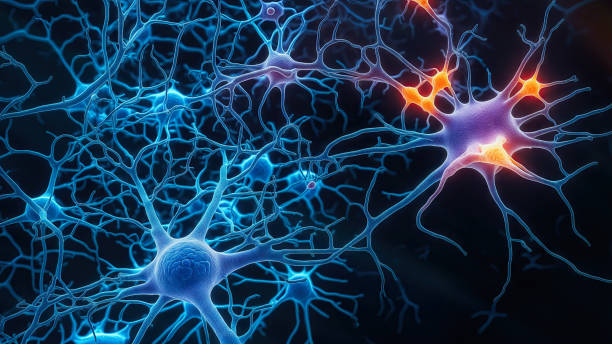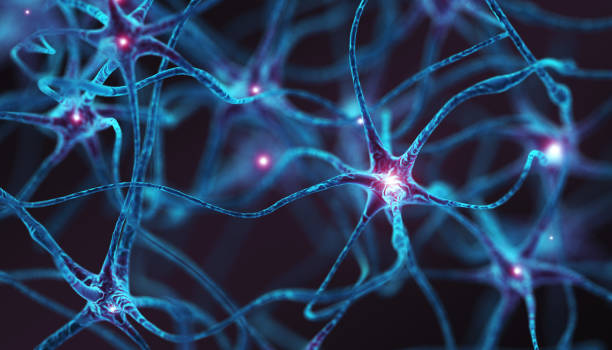Myelination and Signaling Speed:

Myelination refers to the process of forming a protective sheath (myelin) around nerve fibers (axons) in the brain. This sheath acts as an insulator, allowing electrical signals to travel more efficiently along the axon.
- When axons are myelinated, the speed of neural signaling increases significantly. Think of it like upgrading from a narrow dirt road to a superhighway – signals zip along faster.
- Myelin is produced by specialized cells called Oligodendrocytes in the central nervous system (CNS) and Schwann cells in the peripheral nervous system (PNS).
White Matter Pathways:

White matter consists of myelinated axons bundled together. It forms the communication network within the brain, connecting different regions.
- These pathways allow information to flow between brain regions, coordinating functions like sensory perception, motor control, memory, and cognition.
- As white matter pathways develop, cognitive abilities improve. For example, better connectivity between the prefrontal cortex (responsible for decision-making) and other brain areas enhances executive functions.
Role in Brain Power:
Myelination and white matter development contribute to overall brain power:
Faster Processing: Efficient signaling means quicker processing of information.
Learning and Memory: Improved connectivity supports learning and memory consolidation.
Complex Tasks: Enhanced white matter allows for more complex cognitive tasks.
Problem-Solving: Better communication between brain regions aids problem-solving skills.
Remember, brain development is a life-long process influenced by genetics, experiences, and environmental factors. Regular mental stimulation, exercise, and a balanced diet all play crucial roles in optimizing brain health.
Let us explore what helps to improve this myelination process and white matter pathways and what obstructs this myelination process and creation of white matter pathways:
Enhancing Myelination and White Matter Pathways:
- Exercise:Regular physical activity stimulates myelin repair and promotes white matter health.
- Diet:Certain nutrients play a role:
- Vitamin D:Essential for brain health and myelin maintenance.
- Omega-3 Fatty Acids:Found in fish, walnuts, and flaxseeds; they support myelin growth.
- Cognitive Stimulation:Engage in challenging mental activities – learning, problem-solving, and creativity – to promote myelination
Obstacles to Myelination:
- Aging:Myelination changes with age; it peaks during childhood and adolescence.
- Inactivity:Lack of physical exercise hinders myelin repair and white matter development.
- Inflammatory Conditions:Chronic inflammation can disrupt myelin production.
- Neurological Disorders:Conditions like multiple sclerosis affect myelin integrity.
- Genetic Factors:Some individuals may have variations affecting myelination.
Remember, maintaining a healthy lifestyle, staying mentally active, and addressing any underlying health issues contribute to optimal myelination and white matter function.
Myelination, the process of insulating nerve fibers with a fatty substance called myelin, has several important benefits:
- Faster Signaling: Myelin acts as an electrical insulator, allowing nerve impulses to travel more quickly along axons. This increased speed enhances communication between different parts of the nervous system.
- Efficient Energy Use: Myelinated axons require less energy to transmit signals, as the myelin sheath reduces the leakage of electrical current. This efficiency is crucial for maintaining overall brain function.
- Precision and Timing: Myelination ensures precise timing of neural signals. It helps synchronize complex movements, cognitive processes, and sensory perception.
- Protection and Stability: Myelin provides structural support and protects axons from damage. It also prevents cross-talk between adjacent nerve fibers.
In summary, myelination contributes to efficient neural communication, better cognitive function, and overall brain health.
When myelin is damaged, it can lead to various neurological issues. Here are some consequences of myelin damage:
- Slowed Signaling: Without proper myelin insulation, nerve impulses slow down. This can result in delayed responses, weakness, and impaired coordination.
- Demyelinating Diseases: Conditions like multiple sclerosis (MS) involve immune-mediated attacks on myelin. As a result, communication between neurons is disrupted, leading to symptoms such as vision problems, muscle weakness, and fatigue.
- Loss of Precision: Myelin ensures precise timing of signals. Damage can cause misfiring, affecting motor skills, memory, and cognitive function.
- Increased Energy Consumption: Unmyelinated axons require more energy to transmit signals, impacting overall brain efficiency.
- Risk of Axonal Degeneration: Myelin provides structural support. Damage may lead to axon degeneration, affecting neural circuits.
In summary, myelin damage can significantly impact neural communication and overall brain function.
How can we protect and repair myelin?
Protecting and repairing myelin involves several strategies:
- Healthy Lifestyle:
- Nutrition: Consume foods rich in omega-3 fatty acids (found in walnuts and flax seeds) and antioxidants (berries, leafy greens) to support brain health.
- Hydration: Proper hydration is essential for myelin maintenance.
- Exercise: Regular physical activity promotes myelin growth and overall brain health.
- Omega-3 Fatty Acids:
- Omega-3s (e.g., DHA) are crucial for myelin synthesis. Consider foods like walnuts and flax seeds.
- Vitamin B12 and Folate:
- These vitamins are essential for myelin repair. Consume foods like dairy, and leafy greens.
- Avoid Toxins:
- Minimize exposure to toxins (e.g., heavy metals, pesticides) that can harm myelin.
- Reduce Stress:
- Chronic stress affects myelin. Practice relaxation techniques like meditation and yoga.
- Physical Activity:
- Exercise stimulates myelin production. Aim for aerobic and strength training.
- Neurotrophic Factors:
- These proteins promote myelin growth. Aerobic exercise and mental stimulation increase their levels.
Remember, a holistic approach—combining nutrition, exercise, and stress management—supports myelin health.
Let’s explore both the Synapse and the Amygdala in connection with brain function:
Synapse

A synapse is a junction between two nerve cells (neurons). It’s where electrical or chemical signals pass from one neuron to another.
Think of it as a communication bridge in the brain, allowing information to flow.
Synapses and Brain Power
- Synapses are the connections between nerve cells in the brain. They allow information to flow from one neuron to another, forming neural circuits.
- Synaptogenesis, the formation of new synapses, is crucial for learning, memory, and cognitive function. Loss of synapses is linked to neurodegenerative diseases and mental health disorders.
- To improve synapse function:
- Omega-3 fatty acids, uridine, and choline are essential nutrients that support synaptogenesis. Consider supplementation or consume foods rich in these nutrients.
Research shows that “synaptic membrane synthesis” depends on sufficient dietary intake of Vitamin C, Vitamin E, and the mineral selenium
- Exercisepromotes synapse formation, increases blood flow to the brain, and aids in reversing brain damage.
The amygdala (which we’ll discuss next) is also involved in synapse activity.
Amygdala

- The amygdala is a paired nuclear complex located in the cerebral hemispheres.
- It’s part of the limbic system, which plays a crucial role in emotions, memory, and decision-making.
- The amygdala processes fear, anxiety, aggression, and other emotional responses.
- It’s shaped like an almond and consists of several nuclei with distinct connections to other brain areas.
- The left and right amygdala have independent memory systems and contribute to how we perceive and process emotions.
- Electrical stimulation of the right amygdala induces negative emotions, while the left can evoke pleasant or unpleasant feelings.
The Amygdala and Brain Function
- The amygdala plays a key role in regulating emotions, especially fear and aggression. It also influences memory storage, as stress hormones impact its function.
- Emotional memories are stored in the synapses of amygdala neurons.
- To optimize amygdala function:
- Practice stress reduction techniques like meditation and deep breathing.
- Seek professional help for symptoms related to anxiety or PTSD.
- Maintain a healthy diet, stay hydrated, and get enough sleep.
Understanding these brain structures helps us appreciate the intricate workings of our minds.
Remember, our brain is adaptable, and we can positively influence its function through lifestyle choices and targeted interventions.
Posttraumatic Stress Disorder (PTSD) is a psychiatric condition that may develop in individuals who have experienced or witnessed a traumatic event, series of events, or a threatening set of circumstances. These events are often emotionally or physically harmful, even life-threatening. The impact of PTSD can affect mental, physical, social, and spiritual well-being. If you or someone you know is experiencing symptoms related to PTSD, seeking professional help is essential for effective coping and recovery.
Researchers have found that certain compounds can impair synaptogenesis and inhibit the formation of new synapses in the brain.
- Bisphenol A – This compound is found in plastic bottles and containers, food and beverage cans. Researchers have found that it impairs synaptogenesis in the brain. Hence we should eat and drink out of glass, ceramic and stainless steel. Avoid all canned food and plastic containers. BPA-free plastic isn’t much better and can still disrupt hormonal health.
- Lead – Lead is a heavy metal that can accumulate in the body and negatively affect brain function. Research shows that lead exposure can interfere with the formation of brain synapses. Hence we should reduce our exposure to sources of lead.
- Gabapentin – Gabapentin is a medication used to treat epilepsy, neuropathic pain, hot flashes, and restless legs syndrome. Researchers have found that it halts the formation of new synapses.
- Stress – Chronic stress decreases synaptogenesis and decreases the number of synapse connections .
- Source : Optimal Living Dynamics
Which are the wrong habits that can cause brain damage ?
The brain is a remarkable organ that plays a vital role in our daily lives. It is essential to take care of our brain health to maintain cognitive function, memory and overall mental well-being. Habits play a significant role in shaping our brain health. Our daily routines and behaviors can either promote or hinder optimal brain function.
Here are some habits that may negatively impact your brain health:
- Skipping Breakfast: Missing breakfast can lead to lower blood sugar levels, affecting cognitive function.
- Overreacting: Chronic stress and overreacting can harden brain arteries, reducing mental power
- Smoking: Smoking causes brain shrinkage and may contribute to conditions like Alzheimer’s disease
- High Sugar Consumption: Excessive sugar intake can harm brain health and increase the risk of cognitive decline
- Sleep Deprivation: Lack of quality sleep affects memory, focus, and overall brain function
- Covering Your Head While Sleeping: Poor ventilation during sleep may impact brain oxygen levels
- Working Your Brain During Illness: Pushing yourself mentally when you’re unwell can strain brain resources
- Lacking Stimulating Thoughts: A lack of mental stimulation can lead to cognitive decline
- Sedentary Life-style: A sedentary lifestyle, characterized by prolonged periods of sitting, poses a significant threat to brain health potentially contributing to cognitive and memory problems.
- Lack of socializing: Loneliness and social isolation have been linked to depression, increased risk of Alzheimer’s disease, and cognitive decline. Less socially active individuals experience a greater loss of grey matter, which is responsible for processing information in the brain.
- Chronic stress: Chronic stress can have a profound impact on brain health, particularly affecting memory and learning processes in the prefrontal cortex.
- Not watching what you eat: Limit your consumption of fried foods and alcohol, as excessive intake can have detrimental effects on brain function.
Remember, making positive changes in these areas can promote better brain health.
Here are five websites that provide comprehensive information on Brain Power Terminologies :
- The BRAIN Initiative Alliance – Key Brain Terms Glossary: This glossary provides definitions for over 340 brain-related terms, including myelin, white matter pathways, synapse, and amygdala.
- Dana Foundation – Glossary: This site offers a comprehensive glossary of neuroscience terms, covering key concepts like myelin, synapse, and amygdala.
- Simply Psychology – What Is White Matter In The Brain: This article explains the structure and function of white matter in the brain, including its role in brain communication.
- Cleveland Clinic – Myelin Sheath: What It Is, Purpose & Function: This page provides an overview of the myelin sheath, its function, and its importance in the nervous system.
- Britannica – Synapse: This entry from Britannica explains the anatomy and function of synapses, including their role in neural communication.
